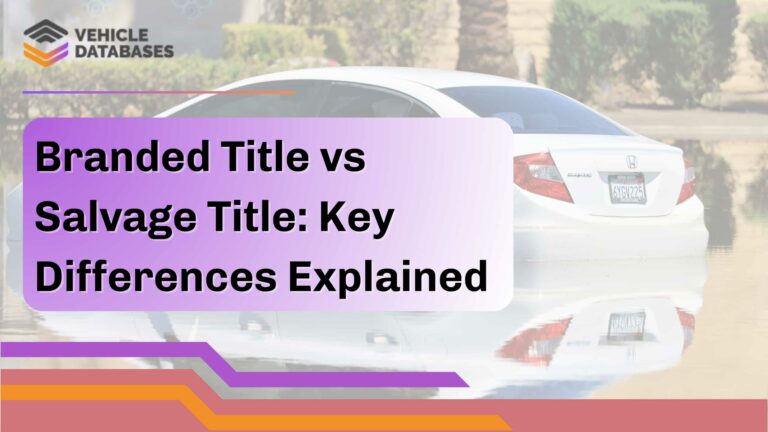With the automotive industry growing quickly, loads of UK vehicle data are generated daily, and it can sometimes be challenging to keep up. How many vehicle records could you store on paper?
The other alternative is building your own UK vehicle database, but why would a business spend time and money building one when they can have full access through others?
With several UK vehicle Data APIs and databases, businesses can view and gain full access to data suitable for their dealerships, auto insurance companies, fleet management, vehicle history report providers, auto repair shops, online marketplaces, and more.
This article will guide you through accessing UK vehicle data using databases and APIs. Save time and improve your business efficiency.
What are UK Vehicle Data APIs?
APIs, or Application Programming Interfaces, are sets of rules and protocols that allow different software applications to communicate with each other.
UK Vehicle Data APIs are specifically designed to provide access to vehicle-related data stored in government and commercial databases. This data can include vehicle registration details, MOT history, tax status, insurance records, and more.
You can view vehicle data, specifications, and history stored in several databases through APIs. Now, where can a business find an API? The following section explains it all.
Read Also: Data Science in the Automotive Industry: Pros and Cons
How UK Vehicle Data APIs Work
To provide a VDI check (vehicle data and information), you must understand how an API works.
- API Keys and Authentication: To use these APIs, businesses typically need to sign up for an account and obtain an API key. This key authenticates requests to the API, ensuring that the user has the right to access the data.
- Making Requests: Once authenticated, they can request API endpoints. These requests are usually made using standard HTTP methods such as GET (to retrieve data) and POST (to submit data).
- Response Formats: The APIs return data in structured formats such as JSON (JavaScript Object Notation), HTML, or XML (eXtensible Markup Language), which are easy to parse and use within applications.
- Rate Limits and Quotas: Most APIs have rate limits, restricting the number of requests that can be made in a given period. This helps prevent abuse and ensures fair usage for all users. There may also be quotas that limit the total amount of data that can be retrieved over a more extended period.
Choosing the Right Database for UK Vehicle Data and VRM Lookup
Several online databases give access to UK vehicle data APIs, allow businesses to use vehicle data, and even provide it to their customers 24/7. Here are two providers you can consider if you want to set up an API for business use:
Vehicle Databases
Vehicle Databases has one of the broadest APIs for UK and US businesses. Our APIs are designed to cater to a wide range of industries, offering detailed and reliable data that can be used across several companies in the auto industry.
With our UK registration decode API and Europe VIN decoding API, businesses can quickly gain access to this information:
- Vehicle Registration Information: Access details about vehicle registration of cars and commercial vehicles, including the make, model, year of manufacture, engine information, and other specifications.
- MOT History: Retrieve a vehicle’s MOT test history, including test dates, results, and any advisory notes or faults recorded.
- Tax Status: Check a vehicle’s current tax status to ensure it is road-legal and compliant with regulations.
- Ownership and Insurance Records: Get information on previous owners and insurance claims associated with the vehicle.
- High-risk records
- Alerts
- Insurance write-offs
- MOT and Tax dues
- Stolen records
- Electric vehicle battery specifications
- And more.
These RESTful APIs are easy to integrate and can even be used without integration. They have 99.99% uptime and are scalable, meaning the APIs can handle large volumes of requests, making them suitable for businesses of all sizes, from small startups to large enterprises.
READ ALSO: How will car API data connect with big auto industry data?
Driver and Vehicle Licensing Agency (DVLA) API
The DVLA maintains comprehensive records of all vehicles registered in the UK. Their vehicle enquiry API provides access to registration information, including make and model, engine size, year of manufacture, and updates on new vehicle registrations.
If you prefer an API from the government directly, you can opt-in for the DVLA database API.
How To Choose The Best Car API Provider
When choosing the right provider, here are some points to consider:
- Data Coverage: This is one of the most essential points to consider. You must pick a database that provides the specific data points relevant to your business needs. Don’t get carried away with ads; make sure to do your research and pick the right provider.
- Ease of Use: To ensure a smooth integration process, check for API documentation, code samples, and support options. Make sure that the APIs you choose are easy to use and integrate.
- Pricing and Subscriptions: Would you prefer pay-as-you-go vs. fixed monthly fees? Explore the payment options available and choose the most cost-effective option. However, don’t make the mistake of trading value for a few dollars.
- Data Security: What data security measures are available? Be sure that your business data will be safe and secure at all times. Verify if the API’s security features are regularly updated to maintain high standards.
Case Studies and Applications of VIN or Registration Number Checks
Smart Car Check uses the Vehicle Databases APIs to provide accurate vehicle records and specifications to car buyers, sellers, and dealers. They utilize the UK registration decode API and Europe VIN decoding API to provide users with complete vehicle details, such as:
- Vehicle specifications
- Registration details
- Auction records
- MOT and tax dues
- MOT history
- High-risk checks
- SMMT checks
- Vehicle images (if available)
- Insurance write-off checks
- Ownership records, and more.
Note that the API is not limited to vehicle history report providers. Other businesses in the UK automotive industry can utilize these APIs. Here are some use cases:
-
- Insurance providers: Insurers can use vehicle data from a VIN or VRM lookup to assess risk and calculate premiums more accurately.
-
- Fleet Management: Companies managing large fleets can monitor the status and health of their vehicles at any time using an external database.
-
- Used Car Marketplaces: Online platforms selling used cars can integrate these APIs to display detailed vehicle information alongside listings. This increases transparency for buyers and builds trust in the marketplace.
-
- Loan and Finance Companies: Lenders can use the APIs to verify vehicle information during the loan application, making risk assessments more efficient.
-
- Car Rental Companies: Rental companies can use APIs to display vehicle specifications of their fleet to customers, and they can use them to keep track of vehicles.
These are just a few examples, and the potential applications for UK data APIs continue to grow as the auto industry embraces technology.
Ready to get an API?
If you want to get UK vehicle data for your business use, your best shot is with an API from a reputable database. One of the top choices is Vehicle Databases. With our proven track record, we offer a comprehensive data offering that aligns with your needs, a user-friendly platform with clear documentation, and excellent support.We even offer 15 free credits to try our vehicle APIs before integration. Sign up now and provide accurate DVLA data on the motor industry to used and new vehicle buyers.
Frequently Asked Questions
How to check UK car history for free?
You cannot get UK car history checks for free. You may be able to get free car reg number decoding but you cannot view history records for free.
How to check car details in the UK?
To check car details in the UK, simply use a car history check service like Smart Car Check. Enter the registration number or VIN into the search form to get vehicle specifications and history records instantly.
What is a VRM look up?
VRM (Vehicle Registration Mark) lookup refers to the process of retrieving information about a vehicle using its registration number (number plate).
How can I check if a car is stolen in the UK for free?
You generally cannot check if a car is stolen for free. To get this information, you will need to use a paid service.




